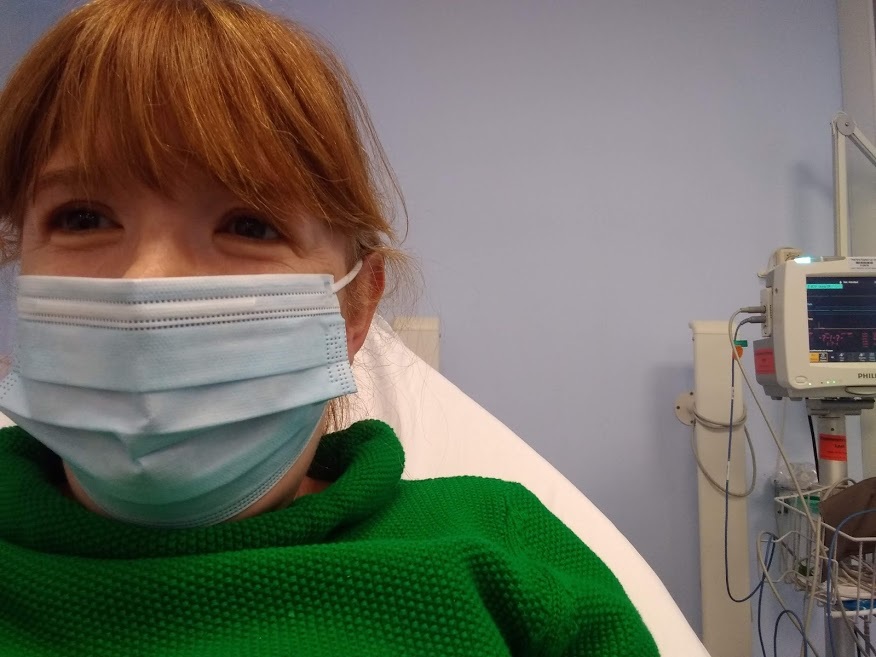Imagine having allergic reactions and not knowing what’s causing them?
Imagine these reactions are so bad that you are prescribed an adrenaline injector but you’re still not 100% sure what has been causing these reactions. Sounds a bit scary right? This is Sarah’s story. She has just had another anaphylactic reaction and still doesn’t know what’s causing it!

This is Sarah’s story.
This is the message I got from Sarah a few months ago, it’s the kind of message you dread getting, that a friend has been rushed to A&E, especially with anaphylaxis, but she was thankfully OK. Here’s her story:
“I had my first epi pen and trip in an ambulance yesterday. I’ve always had allergic reactions to red things: red cocktails, red sauces on veggie dishes, curries & tapas infrequently (eat curries all the time) – I usually only have reactions when drunk and never used my epi pen, just double piriton. I can remember you telling me that alcohol means your body is weaker and more likely to react.
Yesterday I ate almond cake and carrot cake (no alcohol!) and half an hour later when walking (I remembered you said keep still) my allergy came on much quicker. I couldn’t swallow and my lips were huge. My wonderful friend I was with took me to her neighbour who has an Epipen
(I didn’t have mine, big lesson there) and she advised we use it. I know that because of your blog I was much happier to do it too. The adrenaline really helped and the ambulance was there in five minutes and they were great.
So thankyou, it was scary enough when it all went as well as it could.
The almond cake I ate was 40% ground almond as the recipe was gluten free, so used almond instead, but it’s so strange as I make my porridge with almond milk!
They’ve prescribed steroids for three days but I feel fine.“
Thank goodness this story had a happy ending, a quick thinking friend and well placed allergic neighbour with an EpiPen. Thanks go out to that kind soul! You probably just saved a life!
Sarah hadn’t been carrying her adrenaline because she had only ever had reactions while drinking alcohol and this was in the daytime with no drinking involved. A stark lesson that allergic reactions can change, suddenly and without warning.
This must have been a very scary experience. Always carry your adrenaline wherever you go and preferably take two as the first one may not work!
Now Sarah faces the detective journey we are all familiar with, unpicking meals, checking ingredients labels and trying to fathom exactly what caused the reaction. She was beginning to suspect almonds after this recent anaphylactic reaction as the cogs in her brain began to turn and the memories came flooding back.

So how could Sarah have had some mild reactions to almonds but not bad enough to raise serious alarm bells, be eating porridge with almond milk fine and yet react to the cake containing almonds later that day?
Reactions can change over time…
It just goes to show that allergies and allergic reactions can be fickle things. No two reactions are the same, and mild ones can turn into much more serious reactions.
I remember discovering my chestnut allergy and I’d been fine, eating up a whole cake I’d baked with chestnut flour. It was on the final day, eating the last piece of cake while out in a pub garden, drinking some beer and walking up a steep hill that my body decided enough was enough. That was a scary reaction in the middle of nowhere but I recovered after sitting very still for a long time, getting colder and colder, holding an adrenaline injector ready, but in the end not needing it.
More from Sarah…
We chatted about what might have caused her reaction and next steps, like allergy testing to pinpoint and confirm her allergy.
“I have had an allergy since I was 15, I just never known what it was! I have probably always had it, I had food phobias as a child and only ate cheese and potatoes!
“I had allergy tests done 20 years ago and nothing came up, but then all I could say was red sauce or cocktail, so now I can be more specific, red sauce and cocktails could both have almonds I guess. I ate a magnum with almonds last month and thought my tongue felt a bit tingly but nothing to raise alarm bells.
“And I just found peach is in the same family as almond, I had a reaction to peach snaps! I Feel like I finally know what’s going on after 30 years!“
It took Sarah years to piece together all the separate incidents that finally pointed towards what she now suspected to be an almond allergy.
There were some clues:
- Magnum with almonds – made tongue feel tingly (2020)
- Bad reaction to Peach Schnapps – which is a cross reacting fruit with almond allergy.
- Swedish cake at a Eurovision party – It was marzipan! I not a fan marzipan but thought I should try it! I thought it was the colouring… (2016)
- The wedding cake at her cousin’s wedding 9 years ago – When I had my allergy and thought it was the red sauce on my main meal, it was probably Battenburg! (2011)
- On holiday in Greece as a teenager – when you have the free shots when you enter a bar! Taboo (showing my age – ha ha!)
- Curry and Tapas (can’t remember when)
- A set meal at a company do – I can’t remember what it was (I’m a vegetarian so often includes nuts I guess)
On average Sarah has about one anaphylactic reaction every year which is quite frightening. I’ve been the same in the past but have lasted two years without one! Fingers crossed both of us can avoid them for the foreseeable future!
The tests and the future…
To be sure of this suspected almond allergy, Sarah booked some allergy tests but when she spoke to the doctor’s receptionist they told her the tests came back negative.
So what happens next? Sarah is waiting for a referral to the Allergy Clinic, to find out more. To examine those tests to see what they tested for. Did they even test for almond at all?
What if the test for almond did come back negative? What then?
It’s important to note that the tests can be misleading but would normally show up if an allergy was present. They can often show false positives and show an allergy when there isn’t one, but would normally pick up real allergies.
Sarah is left wondering…. what next?
As I discovered in another recent blog about almond allergy, if the reaction is Oral Allergy Syndrome and not an IgE Mediated allergic response it would not show up in blood tests. OAS reactions are normally much less serious but can, in some rare cases, cause more severe reactions. Is this what Sarah is experiencing?
I wanted to share this story because it’s so true of many of our lives, the detective work. The wondering, when will the next one be? The fears that you might not be avoiding the right foods because you’re not 100% certain what is even causing reactions.
It’s so confusing! And then the waiting, because there are not enough allergy specialists to go round.
Stay safe this Christmas Sarah! No almonds, peaches or plums and carry that adrenaline at all times!












Dear Sarah. You will l hope have read my recent comments to Ruth. The NHS will never be able to tell you if you have an almond allergy, they are just not equipped to have sufficient vaccines for testing, just a few basic allergens and limited knowledge. I have for the last 20 years been tested at The Burghwood Clinic 31 High street, Ewell . This is a private allergy clinic which does very precise testing, but it is private. They are very experienced ans have given me a quality of life with which I can cope.. . Hope this will help you, there are NO NHS answers..
Thanks so much Jacquie, I will investigate! Sarah
We will get to the bottom of this Sarah. And I think a diagnosis is important as it will help you manage your lifestyle better. It could be an allergy, it could be OAS or it could be LTP! So timely that the webinar “When plants and allergies collide” came up yesterday, just after publishing your blog!
Thanks Jacquie, I wonder too whether the tests the hospital did for Sarah were the right ones and possible not done soon enough after her reaction. What test that is I don’t know. I attended a brilliant webinar yesterday about plant food allergies, Oral Allergy Syndrome and LTP which stands for Lipid Transfer Proteins I think, and is similar to OAS but can have more delayed and much more serious reactions. The speaker was Isabel Skypala of Royal Brompton and Harefield NHS Foundation Trust and it was such an eye opening into how complex these conditions can be, and if the wrong tests are done they will not be diagnosed properly. I will try to paste some links below at people may find interesting and need to blog in more detail about this, It was a completely new one for me. I didn’t know until my recent research that OAS could be so serious and had never heard of LTP before at all. Watch this space!
For more information on LTP or Lipid Transfer Proteins, check out the Anaphylaxis Campaign website here: https://www.anaphylaxis.org.uk/knowledgebase/allergy-to-lipid-transfer-proteins-ltp-syndrome/